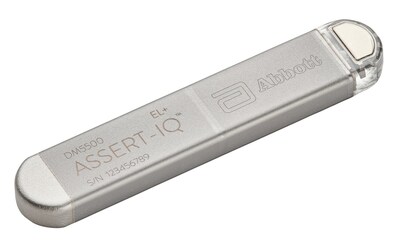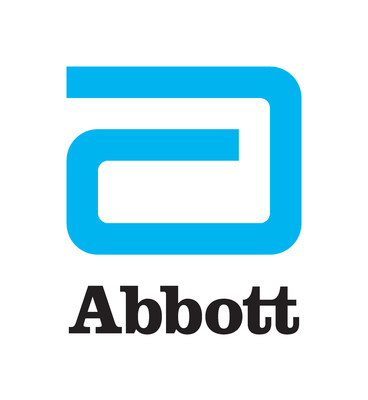Abbott (NYSE: ABT) today announced its Assert-IQ™ insertable cardiac monitor (ICM) has received U.S. Food and Drug Administration (FDA) clearance, giving physicians a new option for diagnostic evaluation and long-term monitoring of people experiencing irregular heartbeats.
ABBOTT PARK, Ill., May 18, 2023 /PRNewswire/ -- Abbott Laboratories (NYSE: ABT) today announced its Assert-IQ™ insertable cardiac monitor (ICM) has received U.S. Food and Drug Administration (FDA) clearance, giving physicians a new option for diagnostic evaluation and long-term monitoring of people experiencing irregular heartbeats. This clearance builds on Abbott's portfolio of connected health devices that can better help doctors manage and treat their patients remotely. Irregular heartbeats – known as arrhythmias – may be fleeting, making diagnosis challenging in many patients. ICMs – small devices with sensors inserted just under the skin of the chest – are designed to provide constant, real-time monitoring of a person's heart to detect and identify arrhythmias that can lead to symptoms such as fainting, irregular pulse and shortness of breath. While many commercially available ICMs monitor a person's heart rhythms for a few years, Assert-IQ offers two options with a battery life of at least three or six years to provide doctors a new level of flexibility in diagnostic monitoring. While the three-year option may be preferred for more traditional monitoring, such as diagnosing fainting, heart palpitations or detections of abnormal heart rhythms, an option offering at least six years of battery life empowers physicians to monitor long-term. This monitoring can be especially important when caring for people who are undergoing therapy, have recently had a cardiac ablation procedure or who are at risk of developing further arrhythmias such as atrial fibrillation. In both options, advanced algorithms are available to detect irregular heartbeats and provide clinically actionable data. "The Assert-IQ ICM is a significant advancement amongst the tools that are currently available for the diagnoses of irregular heart rhythms. Given that the device is small and is inserted just under the skin, patients can go about their daily lives, enjoying the activities they love, and the ICM does the work," said Dhanunjaya Lakkireddy, M.D., medical director of the Kansas City Heart Rhythm Institute. "With Assert-IQ ICM's advanced algorithms, it can detect even hard-to-spot irregularities and help physicians determine a treatment course. It can be a very valuable tool both for short-term and long-term management of cardiac arrhythmia disorders." Using Bluetooth® technology, Abbott's Assert-IQ ICM is designed to remain connected to a transmitter – usually the person's own cell phone – where it checks heart rhythms every 20 seconds, transmitting results in real-time to the clinic's portal. Additionally, some models of the Assert-IQ ICM family can be remotely programmed allowing the clinician to adjust the settings of the connected device, optimize performance and limit unnecessary alerts or transmissions – all without requiring the patient to visit the clinic. The Assert-IQ ICM also offers advanced diagnostic capabilities to provide physicians with more clinically relevant information about the cardiovascular health of the patient, allowing care providers to make clinical decisions faster. "As the incidence of abnormal heart rhythms like atrial fibrillation continue to rise, more doctors are turning to ICM technology to monitor their patients remotely to better detect the cause of symptoms that can impact overall health and quality of life," said Leonard Ganz, M.D., divisional vice president of medical affairs and chief medical officer of Abbott's cardiac rhythm management business. "Until now, insertable cardiac monitors have allowed for remote monitoring of patients but lacked the longevity needed to monitor them long-term. Abbott's Assert-IQ ICM offers physicians a connected health device that will help them provide the best care for their patients while making more accurate and informed treatment decisions." For U.S. important safety information on Assert-IQ ICM, visit: https://bit.ly/3OoJMjE About Abbott: Connect with us at www.abbott.com, on LinkedIn at www.linkedin.com/company/abbott-/, on Facebook at www.facebook.com/Abbott and on Twitter @AbbottNews. † As of 12.31.22. Reveal LINQ‡ User Manual, LINQ II‡ User Manual, Lux Dx‡ User Manual, Biomonitor III‡ User Manual, Biomonitor IIIm‡ User Manual 1. Medtronic. REVEAL LINQ‡ LNQ11 Insertable Cardiac Monitor and Patient Assistant PA96000 Clinician Manual. Updated August 26, 2015. Accessed January 17, 2023. https://manuals.medtronic.com/content/dam/emanuals/crdm/CONTRIB_215651.pdf Brief Summary: Prior to using these devices, please review the Instructions for Use for a complete listing of indications, contraindications, warnings, precautions, potential adverse events and directions for use. Indications for Use: The Assert-IQ™ ICM is indicated for the monitoring and diagnostic evaluation of patients who experience unexplained symptoms that may be cardiac-related such as: dizziness, palpitations, chest pain, syncope, and shortness of breath, as well as patients who are at risk for cardiac arrhythmias such as bradycardia, tachycardia, and sinus pauses. The Assert-IQ ICM is also indicated for patients who have been previously diagnosed with atrial fibrillation (AF) or who are susceptible to developing AF. The Assert-IQ ICM is intended to be inserted subcutaneously in the left pectoral region, also described as the left anterior chest wall. The Assert-IQ ICM has not been specifically tested for pediatric use. Intended Use: The Assert-IQ ICM is intended to help physicians and clinicians monitor, diagnose and document the heart rhythm in patients who are susceptible to cardiac arrhythmias and unexplained symptoms by detecting arrhythmias and transmitting data for review. Contraindications: There are no known contraindications for the insertion of the Assert-IQ ICM. However, the patient's particular medical condition may dictate whether or not a subcutaneous, chronically inserted device can be tolerated. Potential Adverse Events: Possible adverse events (in alphabetical order) associated with the device, include the following: allergic reaction, bleeding, chronic nerve damage, erosion, excessive fibrotic tissue growth, extrusion, formation of hematomas or cysts, infection, keloid formation and migration. Refer to the User's Manual for detailed indications for use, contraindications, warnings, precautions and potential adverse events. An Abbott mobile transmitter is available for patients without their own compatible mobile device. ™ Indicates a trademark of the Abbott group of companies.
SOURCE Abbott |
||
Company Codes: NYSE:ABT |






